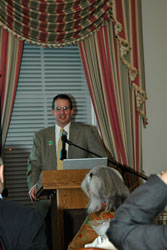- About Ramapo
- Academics
- Admissions & Aid
- Student Life
- Athletics
- Alumni
- Arts & Community
- Quick Links
- Apply
- Visit
- Give
AIS Alum and Acting President of Save Darfur Coalition, Mark Lotwis, Sounds Note of Optimism About Preventing Genocide
(PDF) (DOC) (JPG)October 28, 2010
 (MAHWAH, NJ) During a whirlwind visit to Ramapo on October 28, AIS alum and then Acting President of the Save Darfur Coalition, Mark Lotwis, spoke to several audiences about the possibility of stemming further violence and human rights violations in the troubled African nation of Sudan. The idea to bring Mark to campus came from one of his mentors at Ramapo, Professor of Political Science and International Studies, Cliff Peterson.
(MAHWAH, NJ) During a whirlwind visit to Ramapo on October 28, AIS alum and then Acting President of the Save Darfur Coalition, Mark Lotwis, spoke to several audiences about the possibility of stemming further violence and human rights violations in the troubled African nation of Sudan. The idea to bring Mark to campus came from one of his mentors at Ramapo, Professor of Political Science and International Studies, Cliff Peterson.
The primary purpose for Mark’s visit was a dinner hosted by President Peter P. Mercer and Dr. Jackie Ehlert-Mercer at Havemeyer House and attended by Center for Holocaust and Genocide Studies Advisory Board members, activists, and Ramapo College Alumni Association and Foundation Board members. Mark explained how the Save Darfur Coalition has become influential in shaping not only U.S. policy on preventing genocide, but also, in a more subtle and indirect way, inducing restraint on the part of Sudanese government.
Drawing on what he experienced during his recent fact-finding trip to Sudan, Mark explained in explained how current anxiety hinges on whether the Bashir government in Khartoum will allow referenda in South Sudan and neighboring Anyei, to go ahead as planned in January, let alone accept an outcome in favor of secession. Furthermore, as Mark stressed, it is not just the outbreak of violence in southern Sudan that threatens the peace. Also in Darfur, the government, either directly through its military or indirectly through the notorious Janjaweed militia, could easily resume attacks on civilians.
The talk, which Mark illustrated with video and photos that he took at the U.N.-sponsored camps in Darfur for Internally Displaced persons and at meetings with Darfuri leaders, was followed by a lively Q&A session. In response to several questions about the Obama Administration’s efforts to maintain peace and curbing Human Rights abuses in Sudan, Mark recounted the gist of a meeting between President Obama and advocacy groups in New York during the U.N. General Assembly. He emphasized how he and other attendees came away with the impression that the President was both well informed about developments in the region and determined that his Administration would do everything within the power to prevent any renewed outbreak of violence. In this regard, Mark pointed out, it was crucial for the Administration to appoint a high-level envoy dedicated exclusively to Darfur. In his estimation, it would constitute a signal to Sudan and its supporters in the international community that the United States was fully committed to protecting the people of Darfur from further attacks and seeing the various disputes in the region resolved peacefully one and for all.
Mark conveyed essentially the same message earlier, when he spoke to Dr. Michael Riff’s “Paradigms of Genocide” class. As in his later appearance, questions arose not only about what the Obama Administration could do, but what ordinary Americans, including students, could do to help prevent genocide. Mark was, thereby, provided with the perfect opportunity to announce that as of November 1, 2010 The Save Darfur Coalition and the student-founded Genocide Intervention Network would be merged into one single organization that will harness the power of its constituencies to influence the American government as well as international organizations and corporations to utilize their diplomatic and financial influence to help eradicate the scourge of genocide and large-scale atrocities. As part of that merger, Mark has, in the meantime, resumed his previous post as Senior Director of Campaign Advocacy.
More effectively harnessing student activism in preventing genocide was the topic of a subsequent meeting that Mark had with several AIS students wanting to revive the campus Save Darfur Club. He put them in touch with student leaders from several campuses on how to proceed further. One of the alternatives would be for the Ramapo students to form a core chapter of STAND (Students Taking Action Now Darfur)- the student-led division of the Genocide Intervention Network, that, to quote from its mission statement, “envisions a world in which the international community protects civilians from genocidal violence and elected officials are held accountable for their action, or inaction, in the face of genocide.” All indications point to a STAND core chapter being formed by the spring semester.
Mark’s visit to Ramapo also bore fruit in another respect. At the invitation of Dean Hassan Nejad, Mark is becoming a member of the AIS Alumni Advisory Board. As a consequence, AIS students and faculty can look forward to seeing more of him in the future.
E-News Archives
| 2023 | 2022 | 2021 | 2019 | 2018 | 2017 | 2016 | 2015 | 2014 | 2013 | 2012 | 2011 | 2010 | 2009 | 2008 | 2007 |Copyright ©2025 Ramapo College Of New Jersey. Statements And Policies. Contact Webmaster.

Follow Us!